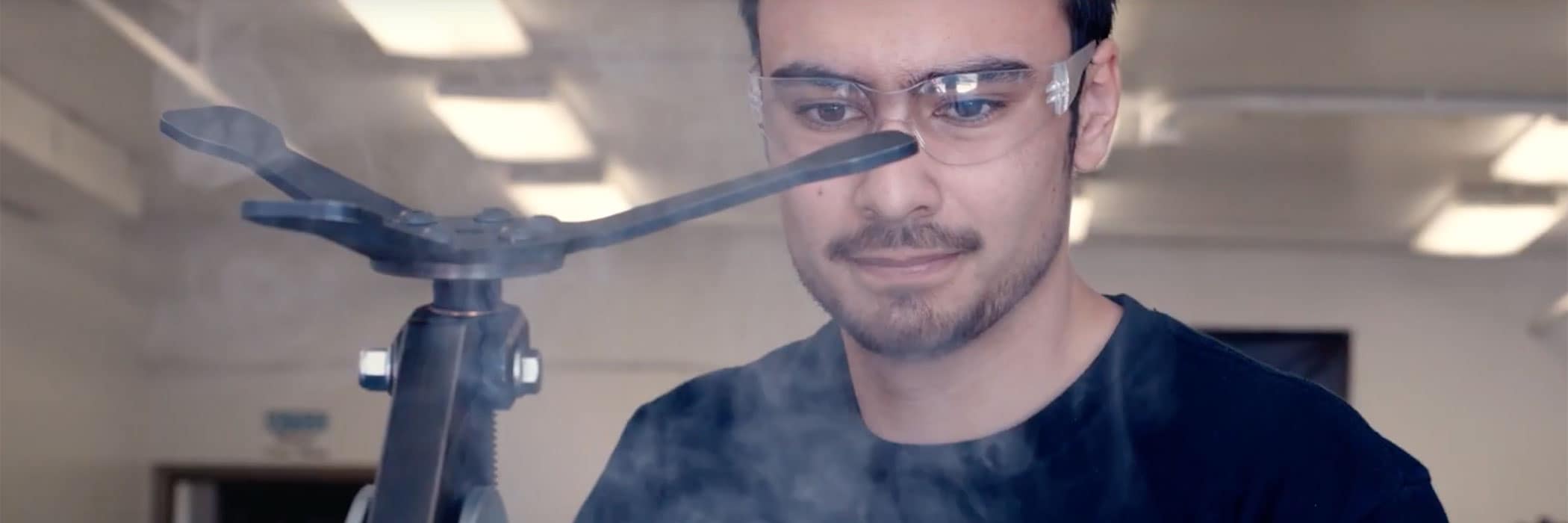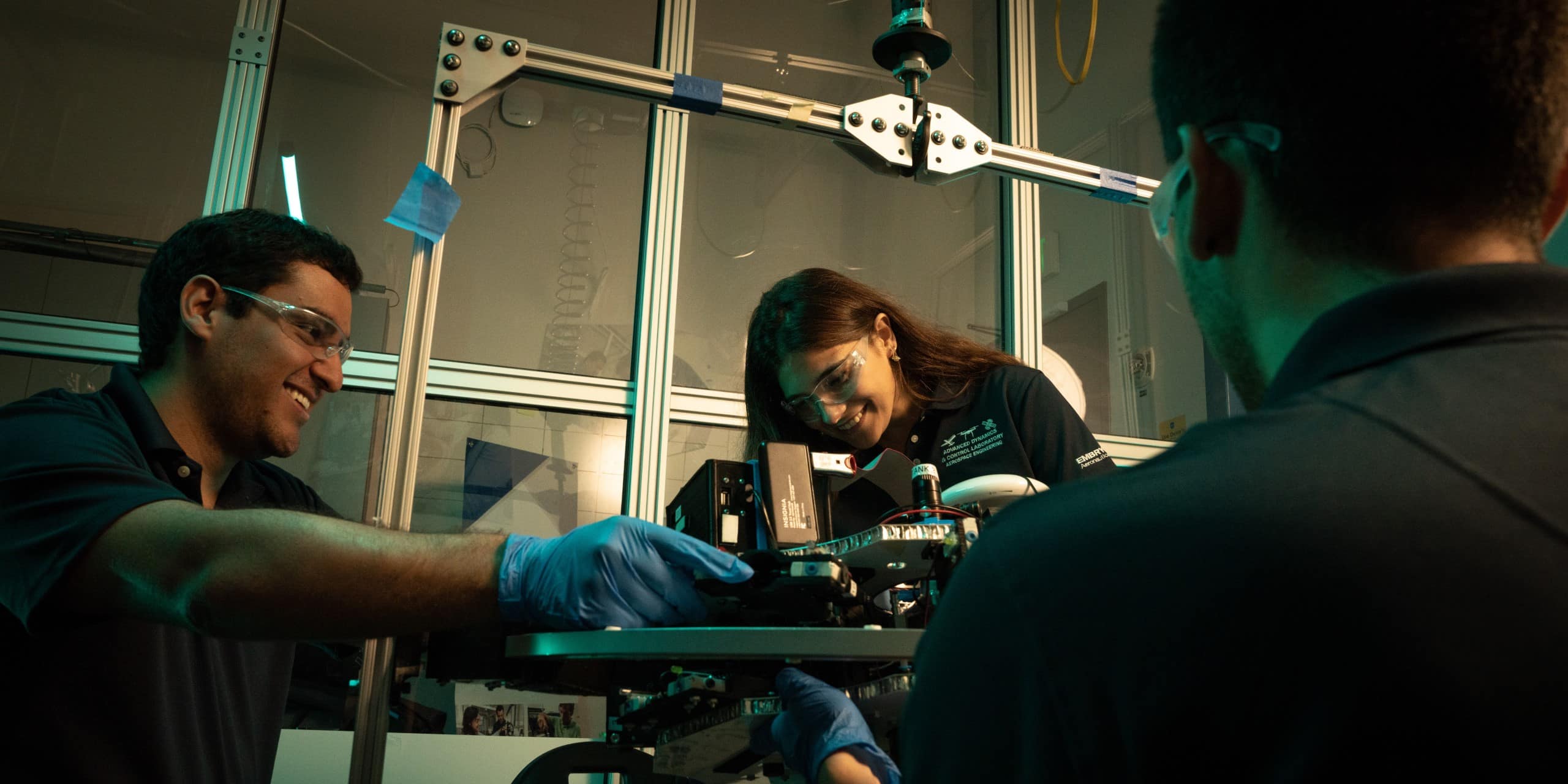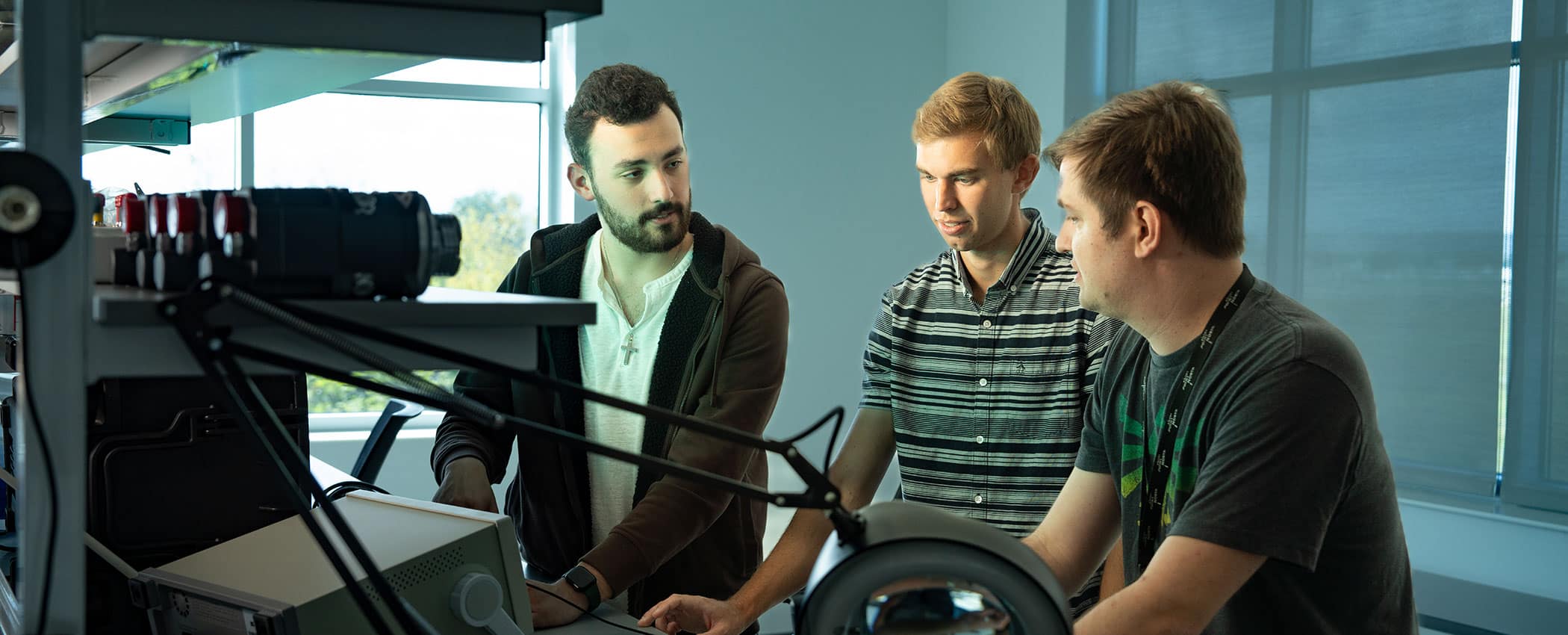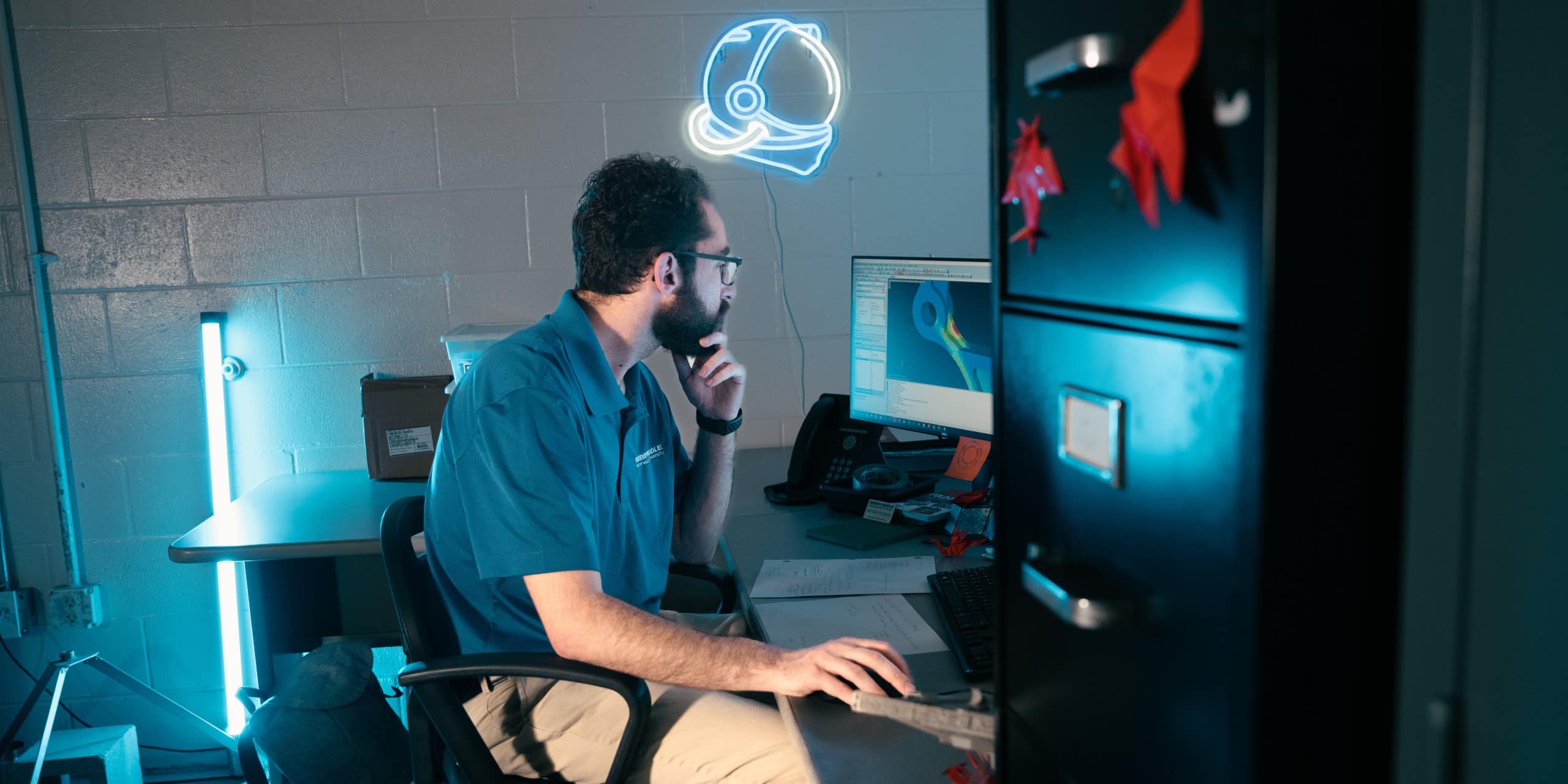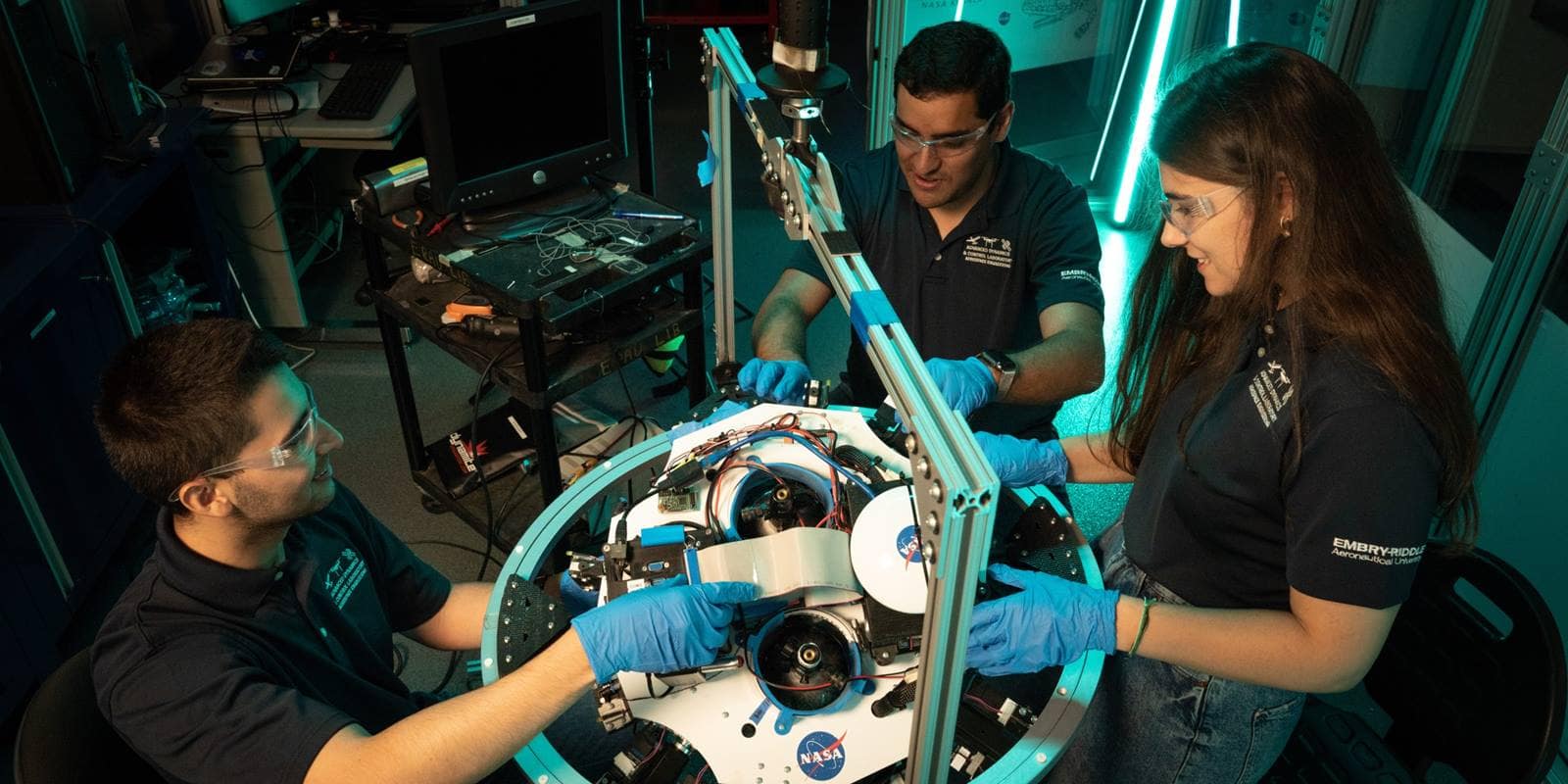
Bachelor of Science in
Engineering
The Bachelor of Science in Engineering is a multidisciplinary degree that prepares students for aeronautical, mechanical, electrical and mechatronics fields.
About the Bachelor of Science in Engineering
At Embry‑Riddle Aeronautical University, we’re preparing our students to help fill the demand for engineers with the Bachelor of Science in Engineering at our Worldwide Campus. The U.S. Bureau of Labor Statistics projects increased demand for engineers with nearly 140,000 new jobs expected between 2016 and 2026.
Designed from a multidisciplinary perspective with subject matter ranging from mechanical, electrical, aeronautical and systems engineering, the online engineering degree intends to help graduates bridge the gap across disciplines to explore innovative solutions to many tasks.
Program Educational Objectives
The engineering program will prepare:
- Technically competent graduates for a successful and productive career in the engineering profession capable of developing creative solutions to contemporary problems
- Graduates who are capable of pursuing postgraduate studies and research
- Graduates who can demonstrate their effective leadership, communication and teamwork skills in a diverse environment
- Graduates with the desire for life-long learning for the purpose of professional integrity
Student Learning Outcomes
The student learning outcomes for the BSE program are:
- an ability to identify, formulate, and solve complex engineering problems by applying principles of engineering, science, and mathematics.
- an ability to apply engineering design to produce solutions that meet specified needs with consideration of public health, safety, and welfare, as well as global, cultural, social, environmental, and economic factors.
- an ability to communicate effectively with a range of audiences.
- an ability to recognize ethical and professional responsibilities in engineering situations and make informed judgments, which must consider the impact of engineering solutions in global, economic, environmental, and societal contexts.
- an ability to function effectively on a team whose members together provide leadership, create a collaborative and inclusive environment, establish goals, plan tasks, and meet objectives.
- an ability to develop and conduct appropriate experimentation, analyze and interpret data, and use engineering judgment to draw conclusions.
- an ability to acquire and apply new knowledge as needed, using appropriate learning strategies.
Engineering Career Opportunities
Careers and Employers
With an 83% placement rate, Embry-Riddle graduates earning a multidisciplinary degree in Engineering often accept employment offers from notable employers including Honeywell, Lockheed Martin, NASA, and the U.S. Department of Defense.
Engineering students are set to work in engineering fields related to aeronautical, mechanical, electrical and mechatronics. Graduates of the program are also prepared to pursue graduate studies and research, with many finding careers as systems engineers, product development engineers, aerospace engineers and electronics engineers.
Engineering Salary Information
Receiving an online engineering degree from Embry-Riddle provides the opportunity for competitive salaries, with alumni averaging $80,000 annually as of 2021.
DETAILS
About Engineering at the Worldwide & Online Campus
The Bachelor of Science in Engineering is a multidisciplinary degree program online that prepares students to enter research, development, and design positions. Online engineering degree graduates function effectively on multidisciplinary teams and contribute to the advancement in engineering-related projects upon graduation.
With flexible classes offered online at your convenience, Embry‑Riddle's Worldwide Campus is especially suited for working students, those on the go, or students who want to save a bit of money while still living at home.
Engineering Information
- Credits: 123
- Capstone: Project (6 credit hours)
- Online or In-Person: Fully online, EagleVision Virtual Classroom, or see if a Worldwide location is close to you
Professional Accreditation
The bachelor of science degree program in Engineering is accredited by the Engineering Accreditation Commission of ABET, https://www.abet.org/, under the General Criteria and Engineering, General Engineering, Engineering Physics, and Engineering Science Program Criteria.
Helpful Links
- Attend a Worldwide Virtual Info Session
- Discover the School of Engineering's Faculty
- Explore the Fields of Study: Engineering
- Find Related Clubs & Organizations
Student Learning Outcomes
Students will:
- Have an ability to identify, formulate, and solve complex engineering problems by applying principles of engineering, science, and mathematics.
- Have an ability to apply engineering design to produce solutions that meet specified needs with consideration of public health, safety, and welfare, as well as global, cultural, social, environmental, and economic factors.
- Have an ability to communicate effectively with a range of audiences.
- Have an ability to recognize ethical and professional responsibilities in engineering situations and make informed judgments, which must consider the impact of engineering solutions in global, economic, environmental, and societal contexts.
- Have an ability to function effectively on a team whose members together provide leadership, create a collaborative and inclusive environment, establish goals, plan tasks, and meet objectives.
- Have an ability to develop and conduct appropriate experimentation, analyze and interpret data, and use engineering judgment to draw conclusions.
- Have an ability to acquire and apply new knowledge as needed, using appropriate learning strategies.
DEGREE REQUIREMENTS
General Education
| General Education | ||
| Embry-Riddle courses in the general education categories of Communication Theory and Skills, Humanities, Social Sciences, Physical and Life Science, Mathematics, and Computer Science are given in the list below, assuming prerequisites are met. Courses from other institutions are acceptable if they fall into these broad categories and are at the level specified. | ||
| Communication Theory and Skills | ||
| ENGL 123 | English Composition | 3 |
| ENGL 221 | Technical Report Writing | 3 |
| COMD 219 | Speech | 3 |
| Mathematics | ||
| MATH 241 | Calculus and Analytical Geometry I | 4 |
| MATH 242 | Calculus and Analytical Geometry II | 4 |
| Computer Science/Information | ||
| ENGR 115 | Introduction to Computing for Engineers | 3 |
| Physical and Life Sciences | ||
| PHYS 150 | Physics I for Engineers | 3 |
| PHYS 160 | Physics II for Engineers | 3 |
| Humanities**/Social Sciences | ||
| Humanities Lower Level | 3 | |
| Humanities Upper Level | 3 | |
| Social Sciences Upper Level | 3 | |
| ECON 225 | Engineering Economics | 3 |
| Total Credits | 38 | |
Core/Major
| Aeronautical Engineering | ||
| AERO 309 | Aerodynamic Performance of Flight Vehicles | 3 |
| ENGR 350 | Project Management for Engineered Systems | 3 |
| Total Credits | 6 | |
| Engineering | ||
| ENGR 101 | Introduction to Engineering | 3 |
| ENGR 120 | Graphical Communications | 3 |
| ENGR 330 | Signals & Systems | 3 |
| ENGR 331 | Signals & Systems Laboratory | 1 |
| ENGR 400 | Fundamentals of Energy Systems | 3 |
| ENGR 450 | Systems and Controls | 3 |
| Total Credits | 16 | |
| Engineering Science | ||
| ESCI 201 | Statics | 3 |
| ESCI 202 | Solid Mechanics | 3 |
| ESCI 204 | Dynamics | 3 |
| ESCI 325 | Engineering Materials and Structures | 3 |
| Total Credits | 12 | |
| Computer Engineering | ||
| CESC 220 | Digital Circuit Design | 3 |
| CESC 222 | Digital Circuit Design Laboratory | 1 |
| Total Credits | 4 | |
| Electrical Engineering | ||
| ELEC 220 | Circuits | 3 |
| ELEC 221 | Circuits Laboratory | 1 |
| ELEC 230 | Electronics | 3 |
| ELEC 231 | Electronics Laboratory | 1 |
| Total Credits | 8 | |
| Physical Science | ||
| PHYS 250 | Physics III for Engineers | 3 |
| PHYS 253 | Physics Laboratory for Engineers | 2 |
| ESCI 206 | Fluid Mechanics | 3 |
| ESCI 305 | Thermodynamics | 3 |
| Total Credits | 11 | |
| Mechanical Engineering | ||
| MECH 302 | Introduction to Robotics | 3 |
| MECH 303 | Robotics Laboratory | 1 |
| MECH 313 | Instrumentation and Data Acquisition | 2 |
| MECH 314 | Instrumentation and Data Acquisition Laboratory | 1 |
| ENGR 404 | Mechatronics | 3 |
| ENGR 405 | Mechatronics Laboratory | 1 |
| Total Credits | 11 | |
| Mathematics | ||
| MATH 243 | Calculus and Analytical Geometry III | 4 |
| MATH 345 | Differential Equations and Matrix Methods | 4 |
| STAT 412 | Probability and Statistics | 3 |
| Total Credits | 11 | |
| Capstone | ||
| ENGR 490 | Capstone Design Project I | 3 |
| ENGR 491 | Capstone Design Project II | 3 |
| Total Credits | 6 | |
| Total Degree Requirements | 123 | |
Plan of Study (BSE)
Planning Your Course Progression
Engineering courses (ENGR, ESCI, ELEC, AERO, MECH, CESC) are offered 5 times a year (August, October, January, March and May). ENGR 490 is offered 3 times a year (August, January and May) and 491 is offered 3 times a year (October, March and August). Other supporting courses (i.e., Calculus, Physics, English, etc.) are offered more frequently. The suggested Plan of Study shows a sequence of courses for a typical four- year program. There are four terms a year. In a given year there are five tracks that these terms are offered. For example, the first track starts with term 1 in August and then progresses with term 2 in October, term 3 in January, term 4 in March, and term 5 in May. The other four tracks follow the same progression but with different start dates for the first term as indicated in the figure. BSE students should follow this approach when planning their course progression.
Year One
| Term 1 | Credits | |
|---|---|---|
| ENGR 101 | Introduction to Engineering | 3 |
| ENGL 123 | English Composition | 3 |
| Credits Subtotal | 6.0 | |
| Term 2 | ||
| MATH 241 | Calculus and Analytical Geometry I | 4 |
| ENGR 115 | Introduction to Computing for Engineers | 3 |
| Humanities Lower-Level (HUMN) | 3 | |
| Credits Subtotal | 10.0 | |
| Term 3 | ||
| MATH 242 | Calculus and Analytical Geometry II | 4 |
| PHYS 150 | Physics I for Engineers | 3 |
| Credits Subtotal | 7.0 | |
| Term 4 | ||
| PHYS 160 | Physics II for Engineers | 3 |
| COMD 219 | Speech | 3 |
| Credits Subtotal | 6.0 | |
| Credits Total: | 29.0 | |
Year Two
| Term 1 | Credits | |
|---|---|---|
| ENGR 120 | Graphical Communications | 3 |
| MATH 243 | Calculus and Analytical Geometry III | 4 |
| ENGL 221 | Technical Report Writing | 3 |
| Credits Subtotal | 10.0 | |
| Term 2 | ||
| MATH 345 | Differential Equations and Matrix Methods | 4 |
| ESCI 201 | Statics | 3 |
| Credits Subtotal | 7.0 | |
| Term 3 | ||
| ESCI 202 | Solid Mechanics | 3 |
| ESCI 206 | Fluid Mechanics | 3 |
| ECON 225 | Engineering Economics | 3 |
| Credits Subtotal | 9.0 | |
| Term 4 | ||
| ESCI 204 | Dynamics | 3 |
| PHYS 250 | Physics III for Engineers | 3 |
| PHYS 253 | Physics Laboratory for Engineers | 2 |
| Credits Subtotal | 8.0 | |
| Credits Total: | 34.0 | |
Year Three
| Term 1 | Credits | |
|---|---|---|
| ESCI 305 | Thermodynamics | 3 |
| ELEC 220 | Circuits | 3 |
| ELEC 221 | Circuits Laboratory | 1 |
| Credits Subtotal | 7.0 | |
| Term 2 | ||
| ELEC 230 | Electronics | 3 |
| ELEC 231 | Electronics Laboratory | 1 |
| CESC 220 | Digital Circuit Design | 3 |
| CESC 222 | Digital Circuit Design Laboratory | 1 |
| Credits Subtotal | 8.0 | |
| Term 3 | ||
| MECH 302 | Introduction to Robotics | 3 |
| MECH 303 | Robotics Laboratory | 1 |
| MECH 313 | Instrumentation and Data Acquisition | 2 |
| MECH 314 | Instrumentation and Data Acquisition Laboratory | 1 |
| Credits Subtotal | 7.0 | |
| Term 4 | ||
| AERO 309 | Aerodynamic Performance of Flight Vehicles | 3 |
| ESCI 325 | Engineering Materials and Structures | 3 |
| Credits Subtotal | 6.0 | |
| Credits Total: | 28.0 | |
Year Four
| Term 1 | Credits | |
|---|---|---|
| ENGR 330 | Signals & Systems | 3 |
| ENGR 331 | Signals & Systems Laboratory | 1 |
| ENGR 404 | Mechatronics | 3 |
| ENGR 405 | Mechatronics Laboratory | 1 |
| Credits Subtotal | 8.0 | |
| Term 2 | ||
| ENGR 450 | Systems and Controls | 3 |
| STAT 412 | Probability and Statistics | 3 |
| ENGR 350 | Project Management for Engineered Systems | 3 |
| Credits Subtotal | 9.0 | |
| Term 3 | ||
| ENGR 490 | Capstone Design Project I | 3 |
| Humanities Upper-Level (HUMN) | 3 | |
| ENGR 400 | Fundamentals of Energy Systems | 3 |
| Credits Subtotal | 9.0 | |
| Term 4 | ||
| ENGR 491 | Capstone Design Project II | 3 |
| Social Science Upper-Level (SOCI) | 3 | |
| Credits Subtotal | 6.0 | |
| Credits Total: | 32.0 | |
| Total Degree Requirements | 123 | |
Get Started Now:
Summary
123 Credits
Estimate your tuition by using the Tuition Calculator
View Financial Aid Information
Learn more about the benefits of an Online Degree
Learn about our General Education
Find out about transferring credits to this degree
Learn more about our Veterans & Military benefits
View our Academic Calendar
Search Courses for this degree
